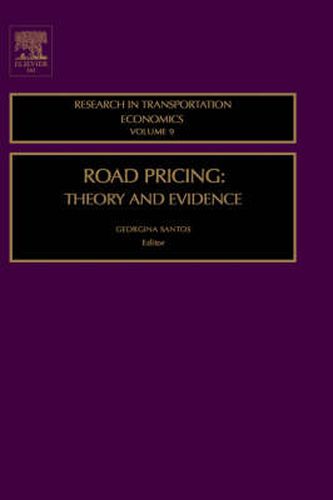Readings Newsletter
Become a Readings Member to make your shopping experience even easier.
Sign in or sign up for free!
You’re not far away from qualifying for FREE standard shipping within Australia
You’ve qualified for FREE standard shipping within Australia
The cart is loading…






Traffic congestion affects towns and cities everywhere and in some places it is regarded as one of the most urgent and important problems in need of a solution. Road pricing is undoubtedly recognised as an effective traffic demand management tool. The recent London congestion charging scheme seems to be showing that public and political opposition is not insurmountable. Thus, the ghost that prevented the introduction of a policy supported by transport economists for over 80 years seems to have disappeared or at least, weakened. The book contains twelve papers useful to different types of audience, such as researchers and postgraduate students, civil servants, policy makers and consultants. The first part is mainly theoretical and concentrates on second-best congestion pricing including pricing in urban contexts, the impact on the performance of the road network, optimal locations and charge levels, dynamic aspects such as time variation of tolls, potential impacts of road pricing on costs and service quality of public transport buses, and efficiency costs and transport sector effects of different types of pricing when they guarantee a balanced budget per mode. The second part contains chapters that describe the schemes in place around the world such as Singapore, Norway, London, and the US. The volume is an update of the state of the art on the subject and the first one to have been written and appear after the London scheme was implemented and to contain an assessment of its preliminary impacts.
$9.00 standard shipping within Australia
FREE standard shipping within Australia for orders over $100.00
Express & International shipping calculated at checkout
Traffic congestion affects towns and cities everywhere and in some places it is regarded as one of the most urgent and important problems in need of a solution. Road pricing is undoubtedly recognised as an effective traffic demand management tool. The recent London congestion charging scheme seems to be showing that public and political opposition is not insurmountable. Thus, the ghost that prevented the introduction of a policy supported by transport economists for over 80 years seems to have disappeared or at least, weakened. The book contains twelve papers useful to different types of audience, such as researchers and postgraduate students, civil servants, policy makers and consultants. The first part is mainly theoretical and concentrates on second-best congestion pricing including pricing in urban contexts, the impact on the performance of the road network, optimal locations and charge levels, dynamic aspects such as time variation of tolls, potential impacts of road pricing on costs and service quality of public transport buses, and efficiency costs and transport sector effects of different types of pricing when they guarantee a balanced budget per mode. The second part contains chapters that describe the schemes in place around the world such as Singapore, Norway, London, and the US. The volume is an update of the state of the art on the subject and the first one to have been written and appear after the London scheme was implemented and to contain an assessment of its preliminary impacts.